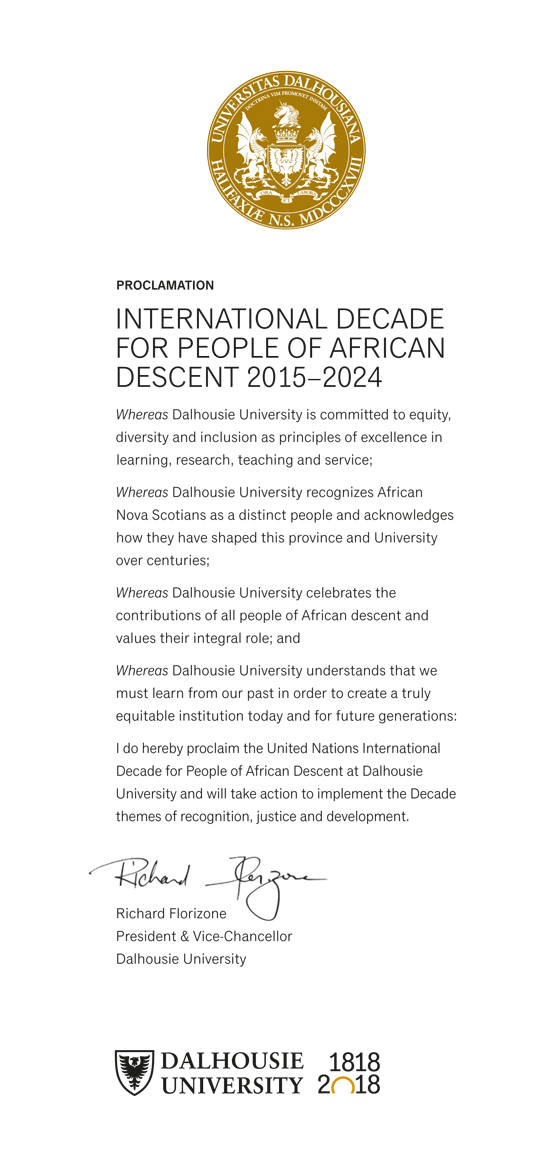When Dalhousie proclaimed the International Decade for People of African Descent in October, it joined the governments of Nova Scotia, Canada and other countries in taking another step towards recognizing the diverse heritage, culture and contributions of African-centered communities worldwide.
The decade, which the United Nations proclaimed as 2015-2024, provides a framework for the protection of the human rights and fundamental freedoms of people of African descent.
Dalhousie’s official proclamation, made by Dal President Richard Florizone at the Viola Desmond Legacy Lecture with Angela Davis on October 16, sets the university on course to take more action on the decade’s themes of recognition, justice and development.
“We recognize African Nova Scotians as a distinct people and acknowledge how they have shaped this province and university over centuries. We celebrate the contributions of all people of African descent and value the integral role they play in our communities,” said President Florizone at the event, quoting a portion of the proclamation.
Full text: Read the full text of the proclamation below
The proclamation is one of 15 priority projects identified for 2018/2019 as part of Dal’s broader diversity and inclusiveness strategy and one of several aimed specifically at individuals of African descent.
“There’s a lot of work going on,” says Jasmine Walsh, Dal’s assistant vice-president of human resources. “Ensuring that we move forward on the decade’s themes of recognition, justice and development will require careful planning and consultation with our campus communities.”
Among work that is already started is the development of a report arising out of the work of the Lord Dalhousie Panel, which is exploring the relationship between George Ramsay, the ninth Earl of Dalhousie, and issues of race and slavery. The panel’s first public engagement session is currently scheduled for December 10 on campus.
Building a broader strategy
Dalhousie is also taking action to strengthen its relationship with the African Nova Scotian community specifically through the development of a strategy that is part of the university’s larger commitment to diversity and inclusion.
Senior Faculty of Law instructor Michelle Williams, also director of Dal’s Indigenous Blacks and Mi’kmaq Initiative, is leading the working group currently crafting the strategy.
“This strategy is really about examining the needs and concerns and aspirations of African Nova Scotian students, faculty and staff,” says Prof. Williams.
She’s joined by Quenta Adams (director of student access and academic support), Michelle Patrick (acting associate director of recruitment) and Barb Hamilton-Hinch (assistant professor in the School of Health and Human Performance) on the working group.
The group has been engaging in consultations with community stakeholders and looking back at past reports, such as the 1989 Breaking Barriers report, to see whether its recommendations have been fully implemented and, if not, what might need to change or be improved upon now.
The strategy, which requires approval by senior administration, will lay out a series of recommendations on how to better meet the needs of African Nova Scotians at Dal and address structural challenges individuals continue to face because of what happened in the past.
The finished strategy could include some recommendations around creating a more accessible university for African Nova Scotians, closer connections between Dal and African Nova Scotian communities, and integrating relevant African Nova Scotian culture and history into Dal’s curriculum, says Prof. Williams.
“The feedback we’ve had so far from the African Nova Scotian community has been really phenomenal and overwhelmingly positive,” says Prof. Williams. “And people recognize the direction Dal has been trying to go in in terms of its work on equity, diversity and inclusion but also in embracing the distinctness of African Nova Scotians as a people and seeking to build that relationship.”


